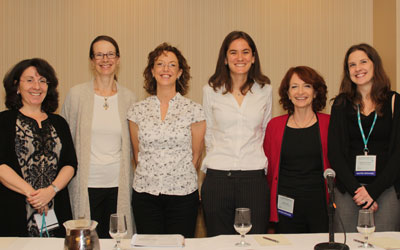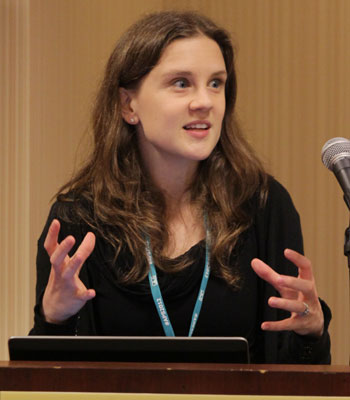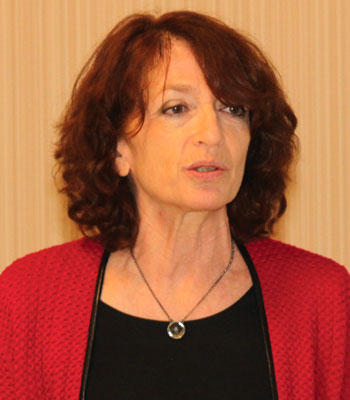Tips for Reeling in Grants From Scientists Who Know

Lisa Feldman Barrett, Lisbeth Nielsen, Melissa W. Riddle, Emily Falk, Betty Tuller, and Rebecca A. Ferrer share their wisdom about federal funding.
With tight budgets and dramatic cuts in federal funding, psychological scientists — like everyone else — are feeling the pinch. Knowing where to find funding and knowing the tricks of the grant writing trade, so to speak, gives researchers an edge in the hunt for precious federal resources. Thankfully for researchers, help arrived in the form of the “Federal Funding for Basic Psychological Science” workshop, held at the 24th APS Annual Convention in Chicago.
The workshop brought together representatives of funding agencies and early-career as well as established psychological scientists to provide researchers with information on the types of research federal agencies fund and how researchers might make their grant applications to these agencies as strong as possible.
When it comes to approaching federal institutes, researchers are often unsure which department in an agency they should apply to for funding, or whether their research fits in with an agency’s mission at all. Betty Tuller, who represented the National Science Foundation (NSF), noted that funding opportunities for psychological scientists at NSF can be found in many different divisions — including some you might not expect. For example, she said the Directorate for Education and Human Resources could be a potential funding source for relevant basic research.

“One thing that I want to stress about the goal of this workship is that it is to help provide you with information that will help you further your program of research and basic psychological science,” says Rebecca A. Ferrer from NCI.
According to Rebecca Ferrer, it’s really important to talk to a program director. She said, “Find out what they are saying the priorities are, tell them about your idea. See if they can help you understand how your ideas fit into their scientific mission.” For example, Ferrer says her agency, the National Cancer Institute, is interested in a wide range of emotional, cognitive, and behavioral research, and investigators — contrary to popular belief — don’t have to work with clinical cancer populations to get funding. Any research examining the bio-behavioral mechanisms or the psychological processes related to reducing incidences and improving the outcomes of cancer are welcome.
According to Lisbeth Nielsen, the National Institute on Aging (NIA) has a similar approach. Although the core interest of the NIA is the aging mind, they are also looking for research on diverse topics such as cognitive processes in middle age, transfer training in adulthood, and interventions to remediate cognitive decline. Psychological science funding can even be found at the National Institute of Dental and Craniofacial Research, where funding opportunities exist for people interested in researching nutrition, parenting, anxiety, and health decision making in relation to oral and dental health care.
Whatever your area of interest, Ferrer notes that “Framing is important. So even if you’re putting forth a basic science project, [you need to outline] what use inspired the work, how can it further cancer prevention and control, or ageing, or any of the scientific biomedical priorities of the institutes.”

Betty Tuller from NSF says a common criticism of grant applications is that they don’t mention what will be learned and why anyone would care.
APS Board Member Lisa Feldman Barrett, a successful researcher and grant awardee from Northeastern University who has received approximately $18 million in grant funding since 2002, echoed the advice of the institute representatives. “What you’re trying to do is to find a home for your research, but in the process, really what you’re doing is your providing a service regardless of what your own motivations are, and you need to be able to speak both languages. That is, you need to be able to speak the language of the basic science that you do, but you also have to be able to speak the language of the scientific priorities of the funding agency that you’re approaching.”
If all this seems a bit daunting or intimidating, take a hint from University of Michigan investigator Emily Falk, who is still in the early stages of her career. “It’s really shocking how nice people are to you when you’re asking for their time and energy and feedback,” she said. Program officers answered her questions, guided her throughout the grant process, and helped make her applications as strong as possible.
Funding for psychological science is out there, even in these times of penny pinching. The key for earning those scarce grant dollars is to find a home for your research within an agency, to frame your research appropriately, and to seek out the help of your friendly neighborhood program officer. Remember, a grant is not just a scientific document. It’s also a chance to show federal funders the value of your work to society. So for the best chance of success, highlight the values of the basic research and make sure to ask for help along the way.





APS regularly opens certain online articles for discussion on our website. Effective February 2021, you must be a logged-in APS member to post comments. By posting a comment, you agree to our Community Guidelines and the display of your profile information, including your name and affiliation. Any opinions, findings, conclusions, or recommendations present in article comments are those of the writers and do not necessarily reflect the views of APS or the article’s author. For more information, please see our Community Guidelines.
Please login with your APS account to comment.